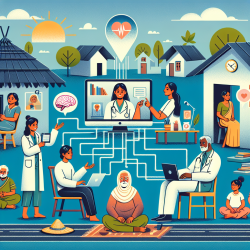The systematic review analyzed 19 studies conducted in LMICs, focusing on various telemental health modalities. These included videoconferencing, online decision support systems, text messaging, and more. Here are the key takeaways:
- Videoconferencing: The most frequently studied modality, showing positive outcomes in reducing symptoms of conditions like Alzheimer's dementia and depression.
- Online Decision Support Systems: These tools improved clinical psychiatric assessment and diagnosis, although some studies noted limitations in diagnostic accuracy for certain disorders.
- Text Messaging and Bibliotherapy: Used effectively in some studies to manage depressive symptoms.
Practitioners can leverage these findings to enhance their telemental health services. Here are some actionable steps:
- Embrace Videoconferencing: Given its proven efficacy, integrating videoconferencing into your practice can enhance patient outcomes.
- Utilize Decision Support Systems: These tools can aid in accurate diagnosis and treatment planning, though it’s essential to be aware of their limitations.
- Incorporate Text-Based Interventions: Text messaging and bibliotherapy can be effective, especially for managing depression and anxiety.
Additionally, the review highlights the importance of context-sensitive implementation. Successful telemental health projects in LMICs often:
- Build local capacity and collaborate with local healthcare stakeholders.
- Adopt user-centered approaches to ensure high acceptance and utilization.
- Utilize low-cost, readily available technologies that are culturally sensitive and easy to operate.
For practitioners, understanding these factors can significantly improve the success of telemental health initiatives. Moreover, the review underscores the need for further research, particularly in comparing telemental health services in LMICs with those in non-LMICs. Such research could provide deeper insights into optimizing telemental health delivery across different settings.
In conclusion, telemental health offers a promising avenue to bridge the mental health service gap in LMICs. By integrating these evidence-based strategies into practice, practitioners can enhance service delivery and patient outcomes. To read the original research paper, please follow this link: Telemental Health in Low- and Middle-Income Countries: A Systematic Review.










